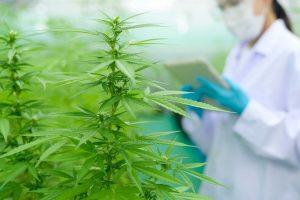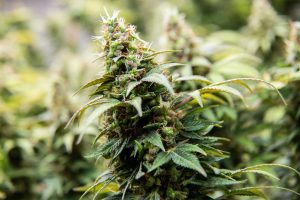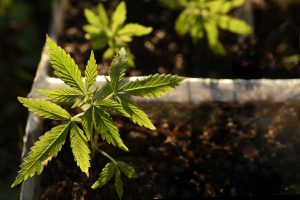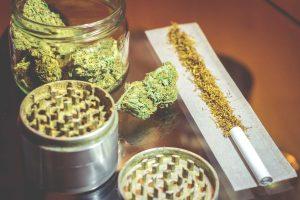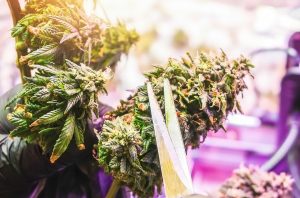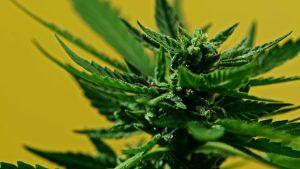How to Harvest Cannabis
- Jake Peter
- Published: December 3, 2021
- Updated: August 5, 2024
- Fact-checked by Dr. Desiree Granados
Harvesting cannabis is a delicate process that requires patience, precision, and the right tools. The harvesting times for various strains of cannabis can vary, depending on what you are looking to grow. However, there are general guidelines for when to harvest cannabis plants in order to get the best results.
Terpenes are organic compounds that are found in all plant material, fruits, vegetables, plants. When it comes to cannabis, they’re considered one of the most important parts of the plant, that’s where the effect comes from, meaning each plant is dominant in different terpenes. Some of those terpenes tend to be more stimulating, focusing, promote wakefulness. Other terpenes are heavily sedating. Some are better for depression, some are better for pain.
So that’s what patients kind of focus on as they’re trying to find the right strain or the right products. They’re always asking, what are the dominant terpenes?
Harvesting cannabis is a delicate process that requires patience, precision, and the right tools. The harvesting times for various strains of cannabis can vary, depending on what you are looking to grow. However, there are general guidelines for when to harvest cannabis plants in order to get the best results.
Cannabis plants should be harvested at the optimal time in order to maximize their potency and provide you with fresh, healthy material that can be used for a variety of different purposes. By harvesting at optimal times, it’s easy to keep homegrown cannabis strong and healthy for as long as you need.
What Should My Cannabis Plants Look Like Before Harvest?
Your plants should be mature, which means that the flowering stage has ended. The trichomes or resin glands on your buds should start to look white and milky, and some may even appear amber-colored. These are important indicators that your plants are ready for harvest.
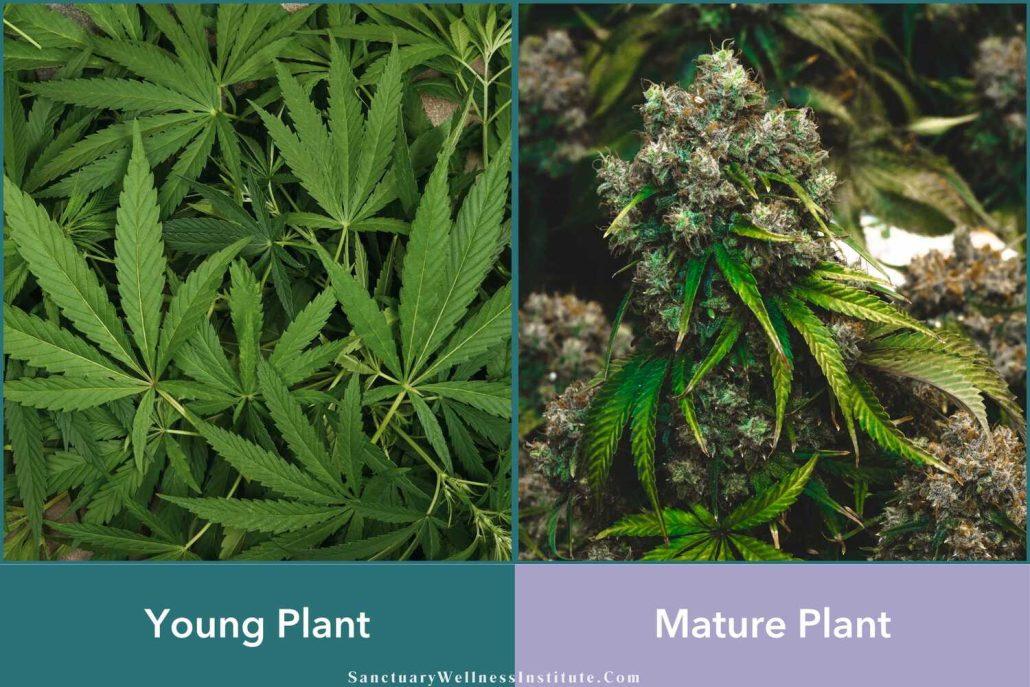
However, it’s also important to note that different strains of cannabis may have different visual signs of readiness. Some strains may have more visible resin glands than others, while others may turn a reddish color before they are fully mature. Do some research on the specific strain you are growing in order to know what visual cues to look for.
- Pistils (hairs) on the buds should be 70-90% darkened and curling inwards towards the bud
- Trichomes (resin glands) on the buds should appear milky white, with some amber or brownish coloration for indica strains and clear or cloudy for sativa strains
- Leaves should start to yellow and wilt, indicating that the plant is putting all its energy into producing buds
It is important to note that these signs will vary depending on the strain of cannabis you are growing. Some plants may show these signs earlier or later than others. It’s important to regularly check your plants and make decisions based on their appearance rather than a set schedule.
When to Harvest Cannabis Grown Indoors
When growing marijuana indoors under lights, you should harvest when the majority of the white hairs have turned brownish gold. Plants should also have at least 50-75% amber colored trichomes before harvesting, since trichomes are where all cannabinoids are stored.
Indoor cannabis plants typically will be ready for harvest within 6-14 weeks, depending on the strain and growing conditions. Keep in mind that it’s better to wait a little longer than to harvest too early, as this will result in lower potency and yield. If you’re unsure about when to harvest, it’s always better to err on the side of caution and wait until your plants are fully mature.
To make sure your plants are healthy enough to harvest, give them a thorough inspection every few days while monitoring pH and nutrient levels. Once your plants are ready for harvest, cut them down at the base and trim off any excess leaves before hanging them upside down to dry.
When to Harvest Cannabis Grown Outside
When growing marijuana outdoors, harvest time varies depending on light intensity and temperature. Just like when people harvest their vegetables and fruit, outdoor cannabis plants should be ready for their first harvest during the long days of summer.
Outdoor grown cannabis typically takes longer to mature, with plants usually being planted in the Spring and then ready for harvest between late September and early November. This extended growing period allows the plants to develop more complex flavors and terpenes, resulting in a better overall product.
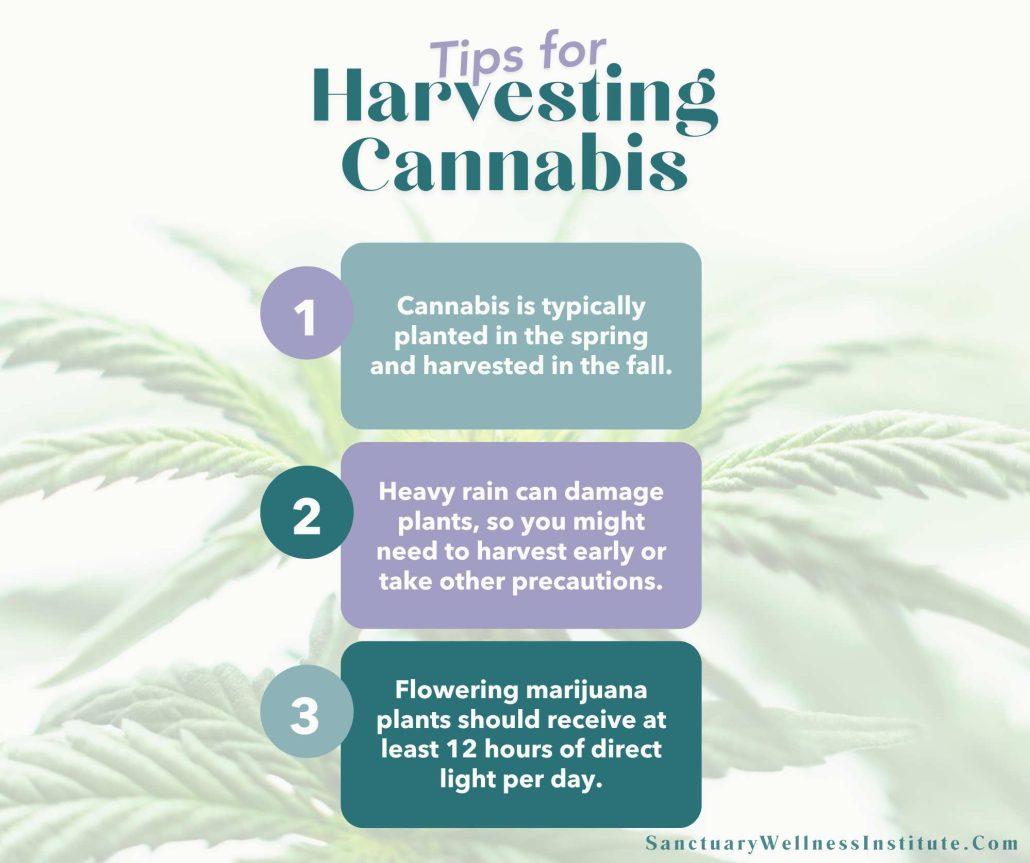
It’s important to monitor weather conditions when growing outdoors as heavy rain or cold temperatures can delay the maturation of your plants. If you are expecting unfavorable weather conditions during the typical harvest time, it may be necessary to harvest a little earlier to avoid potential damage to your crop.
When the plants start to flower, remember to give them at least 12 hours of direct light every day, especially if you want to grow high-THC weed. Using a strain with high levels of both THC and CBD can provide you with more balanced effects that may be beneficial to people who suffer from medical conditions like chronic pain or anxiety.
Other Tips for Harvesting Marijuana
In addition to monitoring visual cues and knowing when your plants are mature, there are a few other tips that can help you successfully harvest your marijuana plants. These include:
- Harvest every bud: Harvest every single bud correctly every time to help keep strains pure and maintain potency.
- Use the right tools: Having a set of professional tools for harvesting makes this task much easier since they’re designed specifically to cut close to the stem without damaging it at all.
- Keep cannabis dry and cool: Make sure all harvested material is completely dried before you place it into containers. You can use ice to keep temperatures low and prevent mold growth during this process.
- Dry marijuana slowly: Drying freshly harvested cannabis slowly is also essential so that trichomes are kept intact – this helps maintain cannabinoid levels and keeps your cannabis potent, allowing you to enjoy its effects for as long as possible.
- Use labels: Label your storage containers by strain type so that they’re easy to find.
- Consider a professional facility for storage: Consider drying, curing, and storing your homegrown cannabis at a professional facility. This process helps preserve the best flavor and aroma of the buds while storing it safely for as long as you need.
- Pull plants instead of cutting: This keeps stems intact so that they can be easily packaged and stored. This step is important because improperly dried marijuana may cause it to mold or rot, potentially losing potency.
Conclusion
Overall, harvesting marijuana is a crucial step in the cultivation process and requires careful attention to detail. By monitoring visual cues and following proper techniques for drying and storage, you can ensure that your harvested cannabis remains potent and flavorful.
Additionally, having a medical card may provide more options for marijuana cultivation, as some states have laws allowing medical patients to grow their own supply of medicinal cannabis. It’s important to research and understand the laws in your state before embarking on any home growing journey.
Frequently Asked Questions
When should I harvest cannabis seeds?
You should harvest cannabis seeds when the plant’s flowers are fully mature and the seed pods begin to split open. This usually occurs 4-6 weeks after pollination. It’s important to wait until this point as harvesting too early can result in immature or unviable seeds.
When should I harvest cannabis for maximum potency?
To achieve maximum potency, harvest cannabis when the majority of white hairs have turned brownish gold and trichomes are at least 50-75% amber in color. This indicates that the plant has reached its peak level of cannabinoid production. Waiting too long to harvest can result in a decrease in potency as the trichomes degrade over time.
How do I know if cannabis buds are over ripe?
Overripe cannabis buds will have a dark and amber color to their trichomes, indicating that they are past their peak potency. The buds may also appear dry and brittle, with a loss of vibrant color and aroma. Harvesting at this stage can result in a decrease in potency and overall quality of the bud.
Should I stop watering cannabis before harvest?
It is recommended to stop watering your cannabis plants a few days before harvest. This allows for any excess water in the plant to evaporate, resulting in a smoother and more flavorful smoke. However, it’s important to still provide some moisture to prevent excessive wilting or drying out of the plant.
Does darkness before harvest affect the quality of marijuana?
Yes, darkness before harvest can significantly affect the quality of marijuana. 12-24 hours of complete darkness before harvesting allows plants to deplete their remaining nutrients and increases resin production, resulting in more potent and flavorful buds.
What happens if I wait too long to harvest cannabis?
Waiting too long to harvest cannabis can result in a decrease in potency and overall quality of the buds. The trichomes will continue to degrade, resulting in a less potent product. Additionally, overripe buds may have a harsh taste and be more prone to mold or fungus growth.
What happens if I harvested cannabis too early?
Harvesting cannabis too early can result in immature or unviable seeds, as well as a decrease in potency and overall quality of the buds. The plant may not have reached its peak level of cannabinoid production, resulting in weaker effects.
What color should trichomes be before harvest?
Trichomes should be mostly cloudy with some amber in color before harvest. This indicates that the plant has reached its peak level of cannabinoid production and is ready to be harvested for maximum potency. Clear trichomes indicate that the plant is not yet fully mature and waiting longer may result in more potent buds.
States Where We Offer Medical Marijuana Card Services
How we reviewed this article:
- Zamir K. Punja, Darren B. Sutton & Tommy Kim (2023). Glandular trichome development, morphology, and maturation are influenced by plant age and genotype in high THC-containing cannabis (Cannabis sativa L.) inflorescences
https://jcannabisresearch.biomedcentral.com/articles/10.1186/s42238-023-00178-9 - Weedmaps (2024). When to harvest weed
https://weedmaps.com/learn/the-plant/when-to-harvest-cannabis - FloraFlex (2023). BEST PH FOR CANNABIS: OPTIMIZING PH LEVELS FOR HEALTHY GROWTH
https://floraflex.com/default/blog/post/best-ph-for-cannabis-optimizing-ph-levels-for-healthy-growth - La Huerta Grow Shop. When to Plant Cannabis Seeds Outdoor
https://www.lahuertagrowshop.com/blog/en/when-to-plant-cannabis-seeds-outdoors/ - Tiney Ricciardi (2023). Cannabis home-growing 101: How to harvest your marijuana plants in Colorado
https://www.denverpost.com/2023/10/09/marijuana-growing-harvesting-trimming-101-homegrow-colorado/ - Kimberly D. Gwinn, Maxwell C. K. Leung, Ariell B. Stephens, and Zamir K. Punja (2023). Fungal and mycotoxin contaminants in cannabis and hemp flowers: implications for consumer health and directions for further research
https://www.frontiersin.org/journals/microbiology/articles/10.3389/fmicb.2023.1278189/full
Current Version
August 5, 2024
Written By
Jake Peter
Fact-checked By
Dr. Desiree Granados
Editorial Process
Our Editorial Process
First Published
December 3, 2021
Written By
Jake Peter
Fact-checked By
Dr. Desiree Granados
Editorial Process
Our Editorial Process
Other Posts About Cultivation

Jake Peter received his journalism degree from Emerson College and has been writing content for the Sanctuary Wellness Institute since 2021. He is passionate about all things cannabis.

